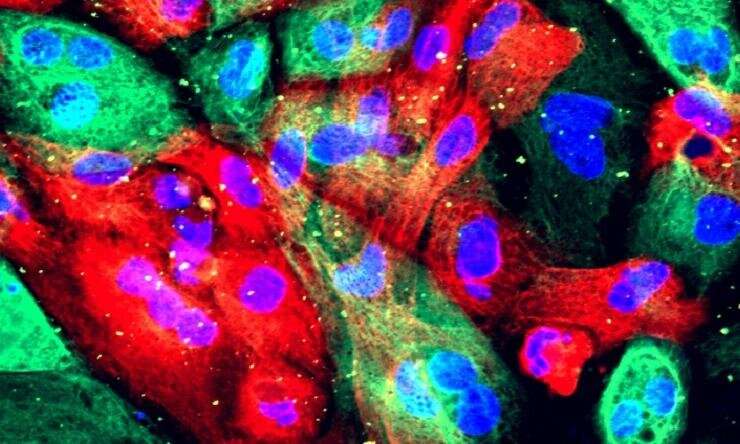Prostate cancer cells. Credit: NIH Image Gallery
For patients with low- or intermediate-risk localized prostate cancer, enzalutamide monotherapy plus active surveillance (AS) is well tolerated and induces a significant treatment response compared with AS alone, according to a study published online June 16 in JAMA Oncology.
Neal D. Shore, M.D., from the Carolina Urologic Research Center in Myrtle Beach, South Carolina, and colleagues compared the efficacy and safety of enzalutamide monotherapy plus AS versus AS alone in patients with histologically proven low-risk or intermediate-risk localized prostate cancer within six months of screening. One hundred fourteen patients were randomly assigned to enzalutamide plus AS and 113 to AS alone.
The researchers found that compared with AS, enzalutamide significantly reduced the risk of prostate cancer progression. The odds of a negative biopsy result were increased 3.5-fold with enzalutamide versus AS. In addition, there was a significant reduction observed in percentage of cancer-positive cores and the odds of a secondary rise in serum prostate-specific antigen (PSA) levels at one year with enzalutamide treatment; however, at two years, no significant difference was seen. Compared with AS, enzalutamide significantly delayed PSA progression by six months. Fatigue and gynecomastia were the most commonly reported adverse events during enzalutamide treatment. Three patients in the enzalutamide arm died; no deaths were considered related to treatment.
"Results suggest that enzalutamide may offer an alternative short-term treatment option for this patient population, potentially reducing the need for more aggressive treatment approaches," the study authors write.
More information: Neal D. Shore et al, Active Surveillance Plus Enzalutamide Monotherapy vs Active Surveillance Alone in Patients With Low-risk or Intermediate-risk Localized Prostate Cancer, JAMA Oncology (2022). DOI: 10.1001/jamaoncol.2022.1641
Journal information: JAMA Oncology
2022 HealthDay. All rights reserved.
























